Is it possible that insulin pumps apart from their infuser function can help prevent cardiovascular diseases?
Well, a large Scandinavian study has been determined to answer this issue and put more in value if there is a device that undoubtedly improved the quality of life of many people with diabetes and that in Spain continues to be applied in very minor amountsto the average of Europe.
The study we are talking about has been carried out among more than 18,000 type 1 diabetics of Sweden and concludes that people with insulin bombs had half of the chances of dying due to causes related to the heart compared to the same people with diabetes that did not carryInsulin pumps.In addition, 25% of people with insulin bombs were less likely to die for any reason.
"Our study shows that the treatment with insulin pumps reduces to almost half the risk of cardiovascular mortality," said Dr. Isabelle Steineck study at the Aarhus University Hospital in Denmark."Personally, I think that more people with type 1 diabetes could benefit from the use of insulin bombs, as long as they achieved all adequate education about the management of insulin bombs," Steineck assured the Reuters agency.
Insulin pumps manage insulin 24 hours a day through a catheter that is placed under the skin.Insulin is supplied in a measured and continuous dose, or if more needed, such as food time, the dose can be increased.
Previous studies on insulin bombs have indicated that insulin bombs provide better blood sugar control and have replaced multiple daily injections.
For the new analysis, Steineck and his team analyzed 18,168 patients with type 1 diabetes in the National Swedish Diabetes Registry.Of these, 15,727 controlled their diabetes with multiple daily insulin injections, while the other 2,441 patients used implanted insulin pumps.The group was followed for almost seven years, until December 2012.
The study team analyzed the rates of fatal coronary heart disease, mortal cardiovascular disease (coronary heart disease or stroke) and death for all causes.
Using an insulin pump, it was associated with a 45 percent reduction in the risk of fatal coronary heart disease compared to the use of injected insulin, a 42 percent risk reduction for fatal cardiovascular disease and a risk 27 bylower hundred of dying for any cause.
Steineck and his team point out, however, they do not know what other factors could have influenced their results.For example, better education and a more frequent follow -up of blood sugar among users of insulin bombs could have helped reduce their risk of heart disease.
The study therefore cannot prove cause and effect, since it is only based on the observation of what happened in recent years, but indicates an interesting aspect to follow.


